Recognize the Present to Repair the Future

Developed in partnership between CAST & PJS Consultants
Interviews & content drafted by artist/writer dana e. fitchett with editing by CAST
If we want a different and more equitable reality, we first have to repair the harm that’s been done.
At CAST, we strive to truly embody our stated commitment to community-centered real estate. We believe this requires entering relationships and communities with care; taking the time to learn and understand the distinct diversity of each community we partner with; and investing in mutually meaningful, long-term partnerships to sustainably bridge the gap between real estate and arts and culture. As an organization working to build a new real estate paradigm in the Bay Area, we know that recognizing the systems of oppression that created and continue to sustain existing inequities is a critical first step if we aspire to transform the status quo for the better.
One way to do this is to honor and invest in the people and institutions who’ve been disproportionately and adversely impacted by these systems—often the very same people who contribute to the artistic and cultural ecosystem that has drawn people to the Bay Area for decades. Listening to our community partners and following their lead is crucial if we are to be humble, thoughtful, and supportive collaborators in support of promising solutions for complex and embedded problems. To this end, we’ve spent time hearing from three of our partners in Oakland about their experiences partnering with CAST as they tirelessly work to provide arts and cultural spaces and programming to their communities. Carolyn Johnson (CJ) of Black Cultural Zone, Trevor Parham of Oakstop, and Anyka Howard of Betti Ono Foundation are three Black Oakland natives who dedicate their time and energy to nurturing the arts and cultural fabric of their hometown.
For artists and cultural organizations—and even more so for those led by and serving Black and other BIPOC people—the battle of securing space is constant.

This is not only due to market forces, but also because of systemically anti-Black practices like generational mortgage discrimination, redlining, and predatory lending terms. With an understanding of this history and an awareness that CAST is perceived as a traditional, long-standing institution, we launched Keeping Space-Oakland, a financial and technical assistance program for Oakland artists facing displacement. By recognizing and addressing these historical inequities as priority criteria for the program, we were able to begin to build trust among Oakland’s Black arts community through our work with Keeping Space. As they began to sense a shift in the ways CAST was working, Oakland-based arts and culture groups started inviting us into their communities and introducing us to their extended networks. During the height of the COVID-19 pandemic—and amidst its disproportionate impact on Black and BIPOC communities; heightened awareness about police killings of innocent Black people; and a spike in deadly California wildfires—the Black arts and culture community approached us to candidly share their request for CAST to leverage our unique position in the arts and culture ecosystem to show up for Black Oakland.
These three partnership stories are the result of long-standing relationships we’ve developed through our programs and through relationships with the broader arts and culture community. As we highlight the remarkable work of these three partners, their efforts to create spaces for belonging and cultivate and sustain the strong Black arts ecosystem in Oakland shine through.
We hope that readers will see that this work is not simply about redirecting financial resources, but also about recognizing and challenging the systemic oppressions that have made for an uphill battle for Black cultural workers so that we might create a truly transformed paradigm.
Real estate dealings often happen behind closed doors, making it difficult or impossible for everyday people to understand how they happen, unless they make their way into those rooms. Our goal in sharing these stories is to make our own real estate work more transparent while also paying forward some of the learnings we feel so fortunate to gain through our experience and work with CAST community partners. Whether it’s information about how to secure space for your own work or considerations for how to enter community partnerships with more grace, we hope you take something away from our story series that can inform the ways you move forward in community.
Read the series
This six-part blog series was developed in partnership between CAST and PJS Consultants, with interviews and content drafted by artist/writer dana e. fitchett, and editing by CAST.
- Read more about Black Cultural Zone pt. 1: A Demonstration of the Power of Hope
- Community Engagement
Black Cultural Zone pt. 1: A Demonstration of the Power of Hope
The story of Black Cultural Zone and Liberation Park.
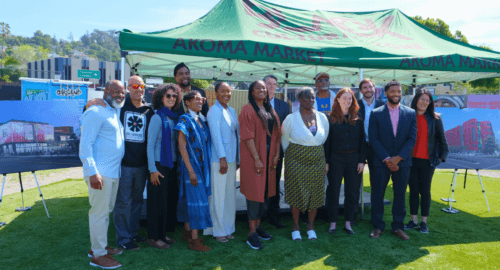
- Read more about Black Cultural Zone pt. 2: Reparations as Requisite for Reimagining
- Community Engagement
Black Cultural Zone pt. 2: Reparations as Requisite for Reimagining
Working with BCZ and learning to take more risks.
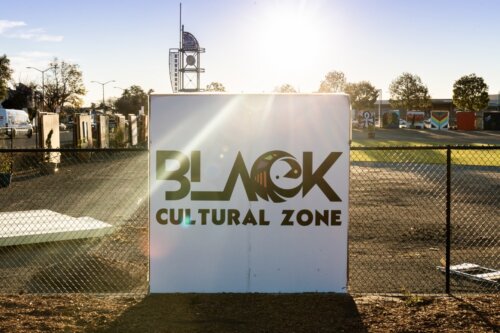
- Read more about Oakstop pt. 1: Stabilizing Space and Place
- Community Engagement
Oakstop pt. 1: Stabilizing Space and Place
The story of Oakstop and how they’re shifting the narrative for community work.
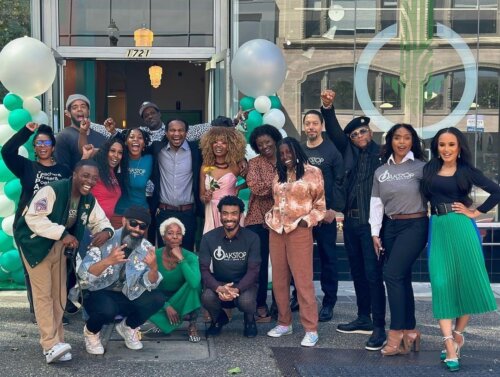
- Read more about Oakstop pt. 2: Building Legacy and Creative Ecosystems
- Community Engagement
Oakstop pt. 2: Building Legacy and Creative Ecosystems
CAST and Oakstop reimagining community spaces through creative ownership.
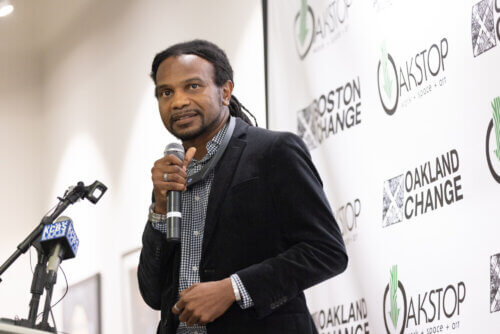
- Read more about Betti Ono pt. 1: Building Cultural Permanence Through Art, Community, and Bold Leadership
- Community Engagement
Betti Ono pt. 1: Building Cultural Permanence Through Art, Community, and Bold Leadership
Learn about how Betti Ono is redefining cultural belonging and empowering artists in Oakland.

- Read more about Betti Ono pt. 2: Amplifying Black Voices in Oakland’s Cultural Ecosystem
- Community Engagement
Betti Ono pt. 2: Amplifying Black Voices in Oakland’s Cultural Ecosystem
Betti Ono Foundation’s partnership with CAST and the ongoing fight for equitable access to resources for Black cultural workers in Oakland.

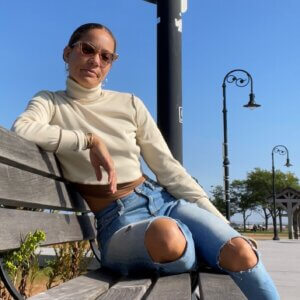
About dana e. fitchett
dana e. fitchett is a trans-disciplinary artist whose practices are grounded in listening and cultivating new languages in service of alignment, integrity, and freedom. Within and outside of PJS Consultants, dana writes and edits for individuals and community organizations working for transformation and justice by way of truth and reconciliation. As Founder and Creative Director of dance collective, Movement for Liberation; teacher of her original Groovement classes; and in her visual art and transcription processes, dana works in and in conversation with the expressive legacy of the African diaspora. Also a novice music producer and practiced plant-based foodmaker, she holds a certificate in nonprofit management and leadership; a bachelor’s degree in urban studies; and a master’s of fine art in interdisciplinary art, and spends most of her time between Boston, Brooklyn, and Oakland.




